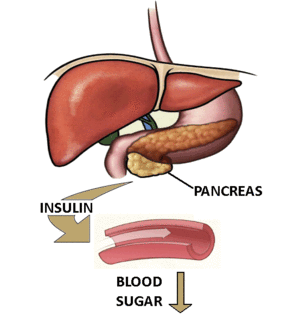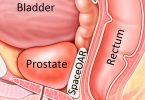
English: Diagram shows insulin release from the Pancreas and how this lowers blood sugar leves. (Photo credit: Wikipedia)
Insulin is a fat storing hormone released by the beta cells in the pancreas. Aside from its major role in blood sugar regulation via the liver, muscle and fat cells, insulin is involved in emotional and cognitive brain function and its’ reward system (“a collection of structures in the brain that attempts to regulate and control behavior by inducing pleasurable effects,”), nerve function, electrolyte (sodium and potassium) balance and hydration, protein synthesis, muscle-building and the aging process (with insulin like growth factor and enzyme activity).
When insulin functions the way it’s supposed to you feel good because everything it’s tied into is running smoothly. When things go awry, there is a domino effect. Anything tied to insulin may not do its’ job the way it is supposed to and MO is full throttle, http://valeriegoldstein.wordpress.com/2013/09/30/what-is-metabolic-overdrive/.
A healthy lifestyle is the absolute best remedy for this. Exercise, makes insulin work more efficiently. Eating carbohydrates, starch and sugar immediately signals the pancreas to release insulin. Avoiding these foods help give the pancreas a rest. Practicing relaxation techniques helps control stress hormones. No need for the pancreas to work in overdrive when you control blood sugar with these healthy behaviors.
If you answer yes to two or more of these questions, insulin is likely the cause of your MO:
Do commercially prepared carbohydrate foods (such as bread, cereal, pasta, potatoes, rice, beans, desserts, soft drinks, and fruit) make up more than 40 percent of each meal or snack that you eat?
Between meals, do you feel hungry or crave sweets, starches (such as bread), or caffeine (such as coffee)?
Do you feel as if you might be addicted to certain types of sweet foods—as if once you start eating these foods, you can’t stop?
When you eat them, do you feel high, followed quickly by an emotional low?
Have you at any time experienced any of the following?
- Feeling thirstier than usual, despite normal water consumption
- Weight gain despite following a weight loss plan or trying to reduce calories or portions
- Sensation of your heart beating quickly (palpitations), even though you have not exerted yourself
- Feeling tired in the morning or during the day, despite adequate sleep
- Feeling sleepy or drowsy after meals
- Feeling shaky when you are hungry
- Feeling faint if you delay a meal or snack by 30 to 60 minutes
- Trembling (shaking) of the hands
- Blurred vision
- Bleeding gums, despite good dental care
- A tingling sensation in your legs or feet
- Low sex drive/libido (lower than in the past or than what you’d like)
- Impotence or erectile dysfunction
- Muscle twitching or cramps
- Excessive sweating, even if you have not exerted yourself
- Fatigue that is relieved by eating
- Dizziness, giddiness, or light-headed
- Have you noticed a change in your ability to focus or concentrate?
- Have you recently developed headaches, suffering one more than once a week?
- Do you feel you have a diminished ability to work under pressure?
- Do you get up to urinate at night?
- Do you frequently wake before 5 a.m., even though you have not set an alarm?
- Do you wake feeling hungry, dry mouthed, or dehydrated?
- Do you gain weight in your stomach rather than in your hips or thighs?
So if you think your insulin may be behind any of these symptoms, consider making an appointment with your primary care physician. Mention that you think you may have an insulin or blood sugar disorder, and be sure to say whether or not this problem runs in your family. Explain that you are interested in a glucose tolerance test with fasting, 1, 2 and 3 hour insulin levels. If you have hypoglycemia (low blood sugar, an early warning sign that diabetes is developing), your 90-minute glucose reading will be lower than your fasting glucose reading. You also might experience a drop in glucose of greater than 30 mm in an hour, or your reading may be below 70. Your sugar is overly high if your fasting glucose is greater than 100, your 2-hour glucose is greater than 140, or if at any point during the test your glucose rises above 200.
If you test normal on your blood work but you answered yes to any of the questions in the quiz, you may be developing an insulin issue that is not yet extreme enough to be detected. If you make no changes to your lifestyle, it may eventually show up!
If you are in MO with an insulin disadvantage, you must strictly adhere to Level 1 eating and you will probably have to stay at this level for a longer period of time than someone who does not have an insulin disadvantage. Follow Level 1 for at least a month, deviating only as needed to ensure that you don’t lose momentum and stop following the plan altogether. You’ll find specific advice for how to modify the plan for success in Chapters 6 and 12 of “The Stubborn Fat Fix“. You also need additional supplements, outlined in Chapter 9.
Related articles
- What is Metabolic Overdrive? (valeriegoldstein.wordpress.com)
- http://valeriegoldstein.wordpress.com/2013/10/06/the-cortisol-connection-to-metabolic-overdrive-mo/ (cortisol MO)
- http://valeriegoldstein.wordpress.com/2013/10/15/the-thyroid-tie-in-to-metabolic-overdrive/ (Thyroid MO)
- http://valeriegoldstein.wordpress.com/2013/10/21/yeast-yields-metabolic-overdrive/ (Yeast MO)
- http://valeriegoldstein.wordpress.com/2013/10/28/hormonal-havoc-harnesses-metabolic-overdrive-part1/ (Hormones MO Part 1)
- http://valeriegoldstein.wordpress.com/2013/11/04/hormonal-havoc-harnesses-metabolic-overdrive-part-2/ (Hormones MO Part 2)




Reblogged this on Valerie's Voice: For the Health of It.
It is truly a nice and helpful piece of info. I am happy that you shared this helpful info with us. Please stay us informed like this. Thanks for sharing.